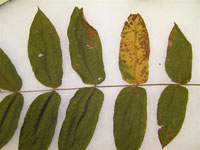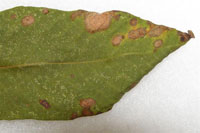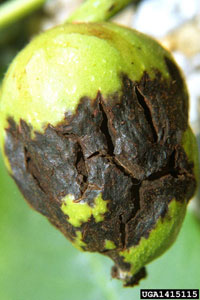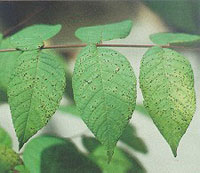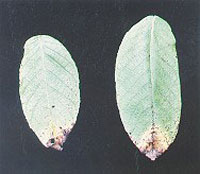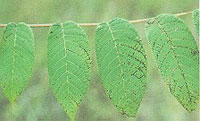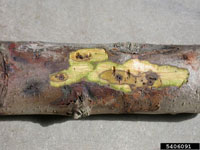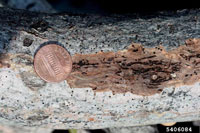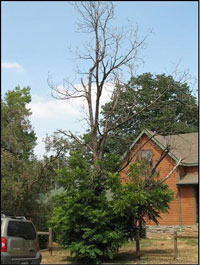Extension > Garden > Diagnose a problem > What's wrong with my plant? > Deciduous Trees > Black Walnut > Leaves fall off prematurely
Black Walnut > Leaves > Leaves fall off prematurely
1 of 3
Anthracnose
Gnomonia leptosyla
- Leaflets have circular brown spots surrounded by yellow tissue
- Infected leaves turn yellow, then brown on the margins, curl and eventually fall off
- Dark brown to black spots or blotches form on nut husks
- Nuts drop prematurely
- More information on Walnut Anthracnose
2 of 3
Leaf spot
Mycosphaerella juglandis
- Small black spots scattered across leaf
- Dark brown veins and leaf tips are common due to many spots forming on leaf veins and leaf tips
- As the disease progresses, leaves yellow and fall off
- In mid-summer leaves appear yellow from a distance
- Occurs on black walnut and butternut
- More information on Leaf spot
3 of 3
Thousand canker disease
Geosmithia morbida
- Leaves on one to several branches in the canopy turn yellow, wilt and turn brown
- Dead branches appear in the top of the tree, the tree eventually dies from the top down
- Groups of young green shoots often form on the lower trunk or branches of infected trees
- When the bark is peeled back, numerous gray to black oval cankers can be seen, often with borer galleries
- Bark surface may show no symptoms or may exhibit an amber stain or cracking immediately above cankers
- 1/32nd inch or smaller exit holes from the walnut twig beetle may be visible on dead and dying branches
- Currently not found in MN. If suspected, report it to the Minnesota Department of Agriculture at the "Arrest the Pest" Hotline: 651-201-6684 (metro) or 1-800-545-6684 (Greater Minnesota)
- More information on Thousand Cankers Disease



